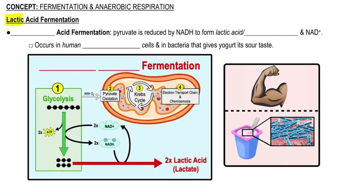Textbook Question
Which of the following correctly describe the fermentation pathway? Select True or False for each statement.T/FIt includes a reaction that oxidizes NADH to NAD+.T/FIt synthesizes ATP by substrate-level phosphorylation.T/FIt includes a reaction that reduces NAD+ to NADH.T/FIt synthesizes electron acceptors, so that cellular respiration can continue.
2196
views





